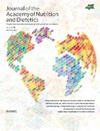Association Between Avocado Consumption and Diabetes in Mexican Adults: Results From the 2012, 2016, and 2018 Mexican National Health and Nutrition Surveys
IF 3.5
2区 医学
Q2 NUTRITION & DIETETICS
Journal of the Academy of Nutrition and Dietetics
Pub Date : 2025-01-01
DOI:10.1016/j.jand.2024.04.012
引用次数: 0
Abstract
Background
Avocado contains numerous vitamins, minerals, and phytochemicals that can contribute to reducing the risk of metabolic syndrome and diabetes. However, limited studies have examined the association between avocados and diabetes risk.
Objective
This study aimed to examine the association between avocado consumption and diabetes by sex in Mexican adults.
Design
This was a cross-sectional study.
Participants/setting
Participants included a subsample of adults (aged 20 years and older) from the 2012, 2016, and 2018 Mexican National Health and Nutrition Survey. Avocado consumption was assessed using a 7-day, semiquantitative food frequency questionnaire, and participants were classified as avocado consumers (consuming any amount of avocado) or nonconsumers.
Main outcome measures
Participants were considered to have diabetes if they answered “yes” to “Has a doctor ever told that you have diabetes or high blood sugar?”
Statistical analyses performed
This analysis assessed the association between avocado intake and diabetes using multivariate logistic models by sex and adjusted for relevant covariates.
Results
Of 28 239 Mexican National Health and Nutrition Survey 2012, 2016, and 2018 participants, 25 640 met the criteria (ie, have diabetes outcome and plausible energy and avocado intakes) for this study. More than half of the participants were women, and approximately 45% were avocado consumers, with an average (SE) avocado consumption of 34.7 (0.9) among men and 29.8 (0.8) g/day among women. Avocado consumers had lower odds of diabetes in both unadjusted (odds ratio [OR] 0.762, 95% CI 0.639 to 0.907) and adjusted (OR 0.792, 95% CI 0.632 to 0.993) models among women but not men (OR 1.192, 95% CI: 0.907 to 1.566 and OR 0.914, 95% CI 0.675 to 1.239 for unadjusted and adjusted models, respectively).
Conclusions
Avocado consumption was associated with a lower risk of diabetes, which remained significant even when adjusted for relevant covariates. However, this finding was observed in only women, not men, underscoring the importance of personalized nutrition in diabetes care and prevention.
墨西哥成年人食用牛油果与糖尿病之间的关系:2012、2016 和 2018 年墨西哥全国健康与营养调查的结果。
背景:鳄梨含有大量维生素、矿物质和植物化学物质,有助于降低代谢综合征和糖尿病的风险。然而,有限的研究调查了鳄梨和糖尿病风险之间的关系。目的:本研究旨在探讨墨西哥成年人牛油果摄入量与糖尿病之间的关系。这是一项横断面研究。参与者/背景参与者包括来自2012年、2016年和2018年墨西哥国家健康与营养调查的成年人(20岁及以上)的子样本。研究人员通过一份为期7天的半定量食物频率问卷来评估牛油果的消费情况,并将参与者分为牛油果消费者(食用任意数量的牛油果)和非消费者。如果参与者在“是否有医生告诉过你患有糖尿病或高血糖?”这个问题上回答“是”,那么他们就被认为患有糖尿病。该分析使用多变量逻辑模型按性别评估了鳄梨摄入量与糖尿病之间的关系,并对相关协变量进行了调整。在2012年、2016年和2018年墨西哥国家健康与营养调查的28239名参与者中,25640名符合本研究的标准(即有糖尿病结局和合理的能量和鳄梨摄入量)。超过一半的参与者是女性,大约45%的参与者是牛油果消费者,男性的平均牛油果消费量为34.7(0.9)克/天,女性为29.8(0.8)克/天。在未调整模型(OR = 0.762, 95% CI = 0.639 - 0.907)和调整模型(OR = 0.792, 95% CI = 0.632 - 0.993)中,牛油果消费者在女性中患糖尿病的几率较低(OR = 1.192, 95% CI = 0.907 - 1.566, OR = 0.914, 95% CI = 0.675 - 1.239,未调整模型和调整模型分别为OR = 0.914, 95% CI = 0.675 - 1.239)。结论:鳄梨消费与较低的糖尿病风险相关,即使在调整相关协变量后仍然显著。然而,这一发现仅在女性中观察到,而不是在男性中,强调了个性化营养在糖尿病护理和预防中的重要性。
本文章由计算机程序翻译,如有差异,请以英文原文为准。
求助全文
约1分钟内获得全文
求助全文
来源期刊

Journal of the Academy of Nutrition and Dietetics
NUTRITION & DIETETICS-
CiteScore
7.20
自引率
10.40%
发文量
649
审稿时长
68 days
期刊介绍:
The Journal of the Academy of Nutrition and Dietetics is the premier source for the practice and science of food, nutrition, and dietetics. The monthly, peer-reviewed journal presents original articles prepared by scholars and practitioners and is the most widely read professional publication in the field. The Journal focuses on advancing professional knowledge across the range of research and practice issues such as: nutritional science, medical nutrition therapy, public health nutrition, food science and biotechnology, foodservice systems, leadership and management, and dietetics education.
 求助内容:
求助内容: 应助结果提醒方式:
应助结果提醒方式:


